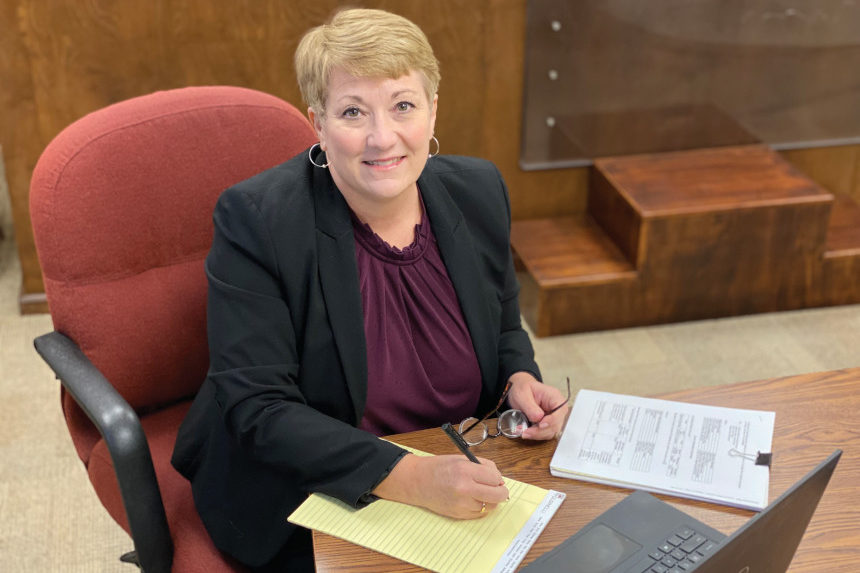Teresa Anderson’s client was desperate to keep her newborn child. In 2019, three days after the baby was born, Anderson, a Kansas City attorney, and Samantha, the worried mother, appeared before Missouri’s Jackson County family treatment court. Samantha’s prospects were poor. Her daughter was born two-and-a-half months premature and had tested positive for methamphetamines. And Samantha’s drug-riddled life didn’t evoke confidence in the court. She had started smoking meth at age 14, she had a criminal record, and the baby’s father was “a narcissistic monster,” as Samantha puts it, who was in and out of jail. Samantha had left him earlier in the year, but she continued to abuse drugs while pregnant. The court deemed her unfit and gave her 24 hours to find a suitable caregiver.
“I felt like my heart was being ripped out of me,” Samantha says.
But Anderson believed in her. An attorney in the Polsinelli law firm, Anderson has decades of pro bono experience advocating for women like Samantha. Anderson encouraged her, telling her that as long as she followed the court’s instructions, she’d get her baby back. Samantha was eager to comply. Motherhood — and unconditional love — had transformed her. As her aunt and mother cared for the baby, Samantha deleted drug dealers from her phone, cut ties with unsavory friends, and got clean.
The duo spoke frequently both inside and outside the courtroom, and about two and a half months after the baby was born, Anderson and Samantha made one of their biweekly court appearances. Samantha wasn’t expecting it to be a momentous occasion; then Anderson spoke to the judge.
“She said, ‘Your honor, I don’t see any reason why this child is not placed back with the mother,’” Samantha recalls. “She blew my mind.”
Samantha regained custody of her daughter on New Year’s Eve. These days she’s in a positive, loving relationship with a new boyfriend, her daughter is healthy, and Samantha volunteers as a mentor in Parents as Partners, an autism program that looks at the welfare of the whole family, not just the parents or the children.
Anderson has helped women like Samantha throughout the Kansas City area to rebuild their lives. She logged 1,900 hours of pro bono work in 2020 alone, both on behalf of Polsinelli and of the Volunteer Attorney Project, a Legal Aid of Western Missouri program that provides free legal services to those in need. Her job: “To make sure that parents who are indigent, who have a constitutional right to raise their own children, are represented adequately in these hearings where [the county] is taking children away,” she says.
Anderson’s work often involves mothers in abusive situations who lack the resources to hire a lawyer. In one case, she worked with a woman whose husband had a history of drug use, criminal behavior, and domestic violence. Anderson helped her get a divorce and custody of her three children. In another case, she spent a year assisting a mother of three who struggled with opiate addiction before entering an inpatient program. The woman is now married, clean, and working at a treatment center as the intake coordinator. Anderson also represented a woman who sought guardianship for a three-year-old boy. The father was incarcerated and the mother had disappeared. It took a year to overcome various legal hurdles, but the woman obtained guardianship, and the boy is now safe, loved, and attending school.
“I’ve always rooted for the underdog,” Anderson says, a spirit that comes from her parents. When Anderson was a child in Denver, her mother started an organization with friends to help the poor. Anderson’s father grew up extremely poor before joining the military and eventually becoming a railroad brakeman, but the family never forgot his humble origins.
“My parents were always working toward us having more opportunity and a better life, and I think it was ingrained in me to help others do the same,” she says.
When she was in third grade, Anderson’s family moved to the Kansas City suburbs. She majored in history at Kansas University and graduated from the Washburn University School of Law in 1991. For eight years she worked as a trial attorney in the Kansas City public defender’s office, then practiced law in the county juvenile court. Since 2000, she’s represented low-income parents in the county’s family court. She’s also serving as a guardian ad litem — a court-appointed guardian — in multiple child custody cases.
Too often, she says, we overlook the challenges facing impoverished parents. Many lack a steady place to live. Their kids transfer from school to school.
“In a lot of my cases, my clients work a job where they’re getting paid next to no money and their employers really could care less whether you have children or not and how you’re raising them or if you even have time to see them,” she says. “I’ve had clients who are working two or three jobs to support their families. I feel like we’re always trying to help people understand that these parents are not perfect by any stretch, but they’re trying hard to make changes.”
Helping clients overcome bad life decisions is what Anderson finds most gratifying about her work. She frequently serves not just as a legal advisor, but as a mentor, cheerleader, and life coach. One recent client, she says, was a mom who was struggling with drug use and drifting from boyfriend to boyfriend.
“She would say, ‘I’m going to live with this boyfriend and it’s going to be perfect and wonderful.’ And then pretty soon it’d be, ‘Oh, that boyfriend is not a good boyfriend.’ It’s disruptive,” she says. “So it’s just teaching her that you have to rely more upon yourself than others, and to teach your children that self-reliance is a good thing so that they’ll want to graduate from high school and maybe go to college.”
With Anderson’s support, the client is clean and sober. Anderson also guided her to The Grooming Project, a local nonprofit that teaches parents in poverty to become dog groomers, which is a high-demand, well-paying trade: Annual salaries in the Kansas City area are $35,000 to $75,000.
“She’s doing great, she’s getting ready to graduate, she’s going to start looking for jobs, and she lives in the dorm at The Grooming Project, which means she’s in a safe environment,” Anderson says. “Her kids will be living with her full-time and they’ll grow up in a different way now. I think she feels really empowered.”
Anderson is also a board member with Kansas Appleseed, part of the nonprofit Appleseed Network, a collection of 16 justice centers focused on reducing poverty and combating discrimination. But her greatest joy, she says, is helping women in difficult situations find stability and success.
“I’m getting to the point where I’m old enough to be a mother to some of my clients, and you just cannot help but feel proud of their accomplishments,” she says. “I know this will sound cliché, but I feel like these clients have done more for me as a human than I ever did for them.”
It’s a nice sentiment, though Samantha disagrees. “She never doubted me. She gave me hope. She got me through this,” she says of Anderson. “She helped me with everything.”
Ken Budd has written for The Atlantic, The Washington Post Magazine, National Geographic Traveler, and many more. He is the author of The Voluntourist. You can sign up for his newsletter about giving, travel, and amazing people at kenbudd.us.
This article is featured in the January/February 2022 issue of The Saturday Evening Post. Subscribe to the magazine for more art, inspiring stories, fiction, humor, and features from our archives.
Featured image: Helping those who need it most: Attorney Teresa Anderson performed 1,900 hours of pro bono work in 2020, much of it for impoverished mothers in abusive situations. (Courtesy Teresa Anderson)
Become a Saturday Evening Post member and enjoy unlimited access. Subscribe now




Comments
What a remarkable and wonderful article about Samantha and Teresa Anderson. We need more news like this
in our newspapers and magazines. It gives us hope for all! Thank you for this.